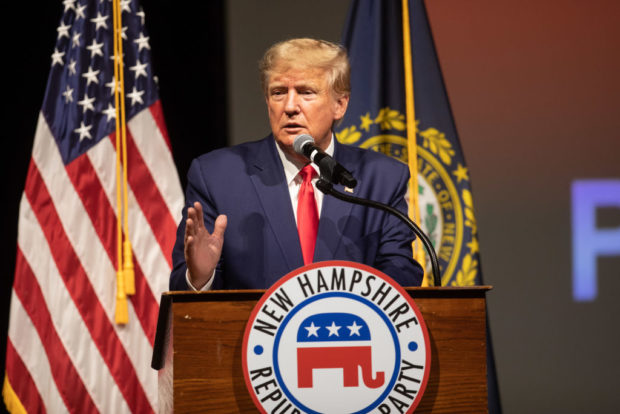Former New York Times editor Liz Spayd said the outlet had a clear double standard and purposely upped its anti-Trump reporting following the 2016 election.
The Columbia Journalism Review’s Jeff Gerth published a lengthy breakdown detailing corporate media’s role in pushing the Trump-Russia collusion narrative. Gerth noted that Spayd is one of many reporters who played a rather large role in pushing the story.
Spayd published a column shortly after the election criticizing the Times’ hesitation to publish the claim that Trump was allegedly made aware of Russia’s efforts to hack the DNC, among other allegations. Spayd told Gerth that the initial story “downplayed its significance,” and made it public in her column that the FBI asked the Times to delay publication.

SALEM, NH – JANUARY 28: Former U.S. President Donald Trump speaks at the New Hampshire Republican State Committee’s Annual Meeting on January 28, 2023 in Salem, New Hampshire.(Scott Eisen/Getty Images)
Spayd also argued in her column that the paper was relentless in its coverage of Hillary Clinton’s email scandal but was “timid” over its reporting on the Russia-Trump investigation. (RELATED: Trump’s ‘Bloodlust’ For White House In 2016 Was ‘Interconnected’ With Putin’s Ukraine Invasion Wishes, MSNBC Host Says)
Spayd told Gerth that the Times had “two standards.” Prior to the election, the Oct. 31 piece was “downplayed” because the Times “didn’t know whether the allegations held up,” Spayd said, but that following Trump’s win “the Times produced a steady stream of stories about whether Trump conspired with Russians to win the election without knowing whether the allegation was actually true.”
The Times, along with The Washington Post, was awarded a Pulitzer Prize for their coverage of Russian interference in the 2016 election. Both outlets would later be criticized for several discrepancies in their story, especially after the infamous Steele Dossier was debunked.












